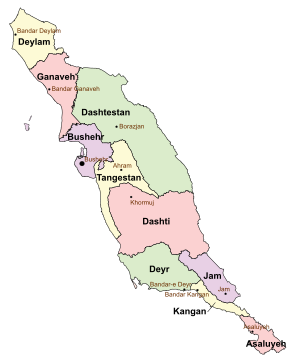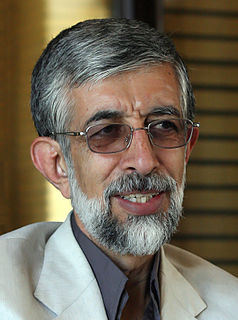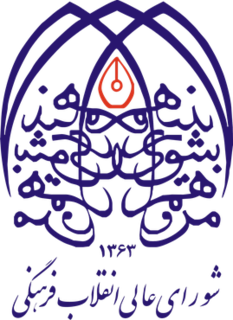
Bushehr Province is one of the 31 provinces of Iran. It is in the south of the country, with a long coastline onto the Persian Gulf. Its center is Bushehr, the provincial capital. The province has ten counties: Asaluyeh, Bushehr, Dashtestan, Dashti, Deyr, Deylam, Jam, Kangan, Ganaveh and Tangestan. In 2011, the province had a population of approximately 1 million people.

Gholam Ali Haddad-Adel is an Iranian philosopher, politician and former chairman of the Parliament. He was the first non-cleric in the post since the Iranian Revolution of 1979. He was one of the candidates in the 2013 presidential election but withdrew on 10 June, four days before the election. He is part of "neo-principalist" group in the Iranian political scene.

The culture of Iran, also known as culture of Persia, is one of the oldest in the world. Owing to its dominant geo-political position and culture in the world, Iran has directly influenced cultures and peoples as far away as Italy, Macedonia, and Greece to the West, Russia to the North, the Arabian Peninsula to the South, and South and East Asia to the East.
Thus an eclectic cultural elasticity has been said to be one of the key defining characteristics of the Persian spirit and a clue to its historical longevity.
Furthermore, Iran's culture has manifested itself in several facets throughout the history of Iran as well as the Caucasus, Central Asia, Anatolia, and Mesopotamia.

Mojahedin of the Islamic Revolution of Iran Organization is a reformist political organization in Iran. It is a small yet influential organization, and participates in political activities similar to a political party. Historian Ervand Abrahamian referred to the group as "a circle of intellectuals and technocrats radical in economic policies but relatively liberal in cultural matters."

The Organization of Iranian People's Fedai Guerrillas, simply known as Fadaiyan-e-Khalq was a Marxist-Leninist underground guerrilla organization in Iran.

The Amir Nezām House, or The Qajar Museum of Tabriz, is a historical building in the Sheshghelan district, one of the oldest quarters of the city of Tabriz, Iran. The base of the edifice covers an area of 1200 square metres. This monument which since 2006 houses a museum dedicated to the Qajar dynasty (1781-1925), was built in the period of the Crown Prince Abbas Mirza (1789-1833). It was renovated by Hasan-Ali Khan, Hasan Ali Khan Garroosy, in his position as the Major-domo of Azarbaijan, and used as his residency. In the subsequent periods, the house was employed as the official residence of the provincial governors of Azarbaijan. Because of persistent neglect over a long period of time, this building had come to be in such a bad state of disrepair that for a time it was seriously considered to demolish it and build a school in its place. Between 1993-2006 it has been subject of an extensive renovation process and since the completion of this undertaking it has been granted the National Heritage status.
Manouchehr Ganji is a human rights activist and a former Minister of Education of Iran from 1976 until 1979.

The Islamic Azad University, Central Tehran Branch is a private research university located in Tehran, Iran. Founded in 1982, Central Tehran is the flagship institution of the universities affiliated with the Islamic Azad University system.
The university is the oldest, the largest and the top university among all branches of Islamic Azad University academic organization, established in 1982, originally as "Islamic Azad University of Tehran".
The university campuses rest on 297,904 m² of various districts of Tehran.
It offers approximately 550 undergraduate and graduate degree programs in a wide range of disciplines such as Sciences, Engineering, Art, Architecture, Humanities, Social Sciences and Medical Sciences.

The Supreme Council of the Cultural Revolution is a conservative-dominated body based in Qom, was set up at the time of Ayatollah Khomeini. Its decisions can only be overruled by Iran's Supreme Leader. Most of its members were appointed by Ali Khamenei, Khomeini's successor.
The President of Iran is ex officio the chairman of the Council.
Roksana Bahramitash, is a sociologist of Iranian background whose work focuses on women, employment and the informal economy in the Middle East and North Africa (MENA), as well as gender segregation in Islam, and Microeconomics. In post-revolution Iran, Dr. Roksana Bahramitash was working on improving peasant women's literacy and access to economic development resources.
Syed Rahim Moshiri(Persian: سید رحیم مشیری, a professor of human geography, Tehran University in Iran.

Mojahedin of the Islamic Revolution Organization was an umbrella political organization in Iran, founded in 1979 by unification of seven underground Islamist revolutionary paramilitary and civil organizations which previously fought against the Pahlavi monarchy.
Bohloul Alijani is an Iranian meteorologist at Tehran University in Iran. He was born in 1946 in the village of Chehregan of city functions Shabestar was born. Natural diploma with first prize was awarded in 1966 Tasuj and after military service in the army of students in 1968 was hired as a teacher in Firoozkooh.In October 1969 by the natural geography college admissions test accepted in 1976 after sending university teachers went to America and finally after 5 years of education with a PhD in geography, climatology orientation returned to Iran. His return coincided with the occurrence Islamic Revolution in Iran and the war was due to the closure of universities and high schools were teaching Firoozkooh.
The reopening of the university in 1983 and began teaching assistant at the College of Yazd with administrative responsibilities in addition to research activities was also busy. At this time two important books, the foundations of climatology and introduction to the field of geography written many articles and papers in scientific journals and his research was published.Since 1983 the Meteorological Organization in Tehran in 1985 and in 1990 collaborated with Tehran Tarbiat Modarres University in Tehran Teachers Training University was transferred.
Society of Muslim Mojaheds or Society of Mojahedin of Islam, alternatively translated as Society of Muslim Warriors, was a Shia Islamist organization in Iran founded in late 1948. Led by Abol-Ghasem Kashani, the organization served as his multi-task religious, political, cultural, and social executive arm and mouthpiece. It was adept at mobilizing crowds for street control, gang fights, strikes and demonstrations.

Rahimberdi Annamoradnejad is an Iranian urban planner. He is a professor of geography and urban planning at University of Mazandaran and holds the position of director-in-charge for journal of Urban Planning Studies.

Golnaz Modarresi Ghavami is an Iranian linguist and associate professor of linguistics at Allameh Tabataba'i University. She is known for her research on Persian phonology and phonetics. Her textbook on phonetics is widely taught in Iranian universities. Modarresi Ghavami received a BA in English translation from Allameh Tabataba'i University in 1989, an MA in linguistics from Ferdowsi University in 1992 and a PhD in linguistics from University of Texas at Austin in 2002.
Institute for Humanities and Cultural Studies is an Iranian Research institute whose main purpose is the study of humanities.

Mehdi Sanaei is a university professor, independent politician and the incumbent ambassador extraordinary and plenipotentiary of the Islamic Republic of Iran to the Russian Federation. As senior international relations scholar and well-known political author, he is the founder of Russian Studies Department in the Faculty of World Studies, University of Tehran and has taught various courses on Eurasia affairs since 2005. Earlier, he was visiting lecturer in political science at Russian State University for the Humanities (RSUH). He has been a member of Russian Academy of Sciences (RAS) since May 2014 and member of Kazakhstan Academy of Social Sciences since 1997.













